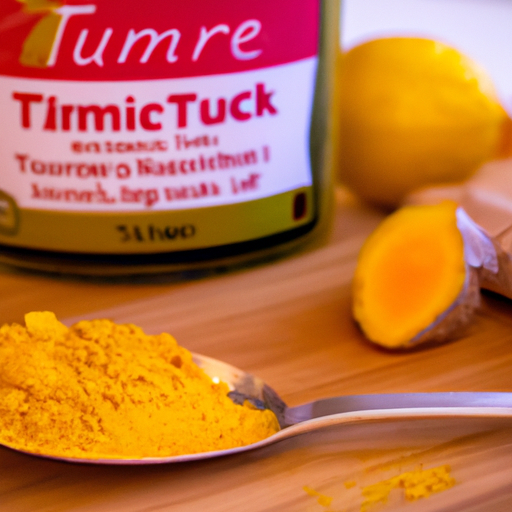You may be aware that turmeric is a golden spice that offers numerous potential health benefits. However, are you aware that you can consume turmeric powder in liquid form? Yes, it’s true! You can mix it into water, milk, or even smoothies to experience its potential advantages.
But before you start gulping down turmeric powder, there are some things you should know. Turmeric has been used for centuries in Ayurvedic and traditional Chinese medicine to treat a variety of conditions, from inflammation to digestive issues. But in recent years, it has gained popularity in the Western world as well.
So if you’re curious about incorporating turmeric into your diet, keep reading to learn more about drinking turmeric powder and how to do it safely.
Key Takeaways
- Turmeric powder can be used as a drink, such as turmeric latte or golden milk.
- Turmeric contains bioactive compounds such as curcumin and may help reduce inflammation, pain, and cellular damage.
- High doses of turmeric powder can lead to gastrointestinal issues and worsen symptoms in individuals with gallbladder issues or bleeding disorders.
- Turmeric powder shouldn’t be used as a replacement for medical treatment.
What is Turmeric?
Turmeric is a spice that’s commonly used in Indian cuisine. The spice comes from the turmeric plant, which is native to Southeast Asia. Turmeric cultivation dates back to ancient times, and it’s been used for medicinal purposes for thousands of years. There are several varieties of turmeric, but the one most commonly used in cooking is Curcuma longa.
Turmeric powder is made from the dried root of the turmeric plant and is often used as a spice in cooking. However, turmeric powder can also be used as a drink. Many people believe that drinking turmeric powder can offer a range of health benefits, such as reducing inflammation and improving brain function.
But is it safe to drink turmeric powder? Let’s find out.
Turmeric Powder as a Drink
Sipping on a warm and comforting beverage made with turmeric powder can be a delicious and healthy way to incorporate this spice into your diet. You may have heard of turmeric latte or golden milk, which are popular drinks made by blending turmeric powder with milk, honey, and other spices.
Turmeric smoothies are also a great option if you prefer a fruity drink. Adding turmeric powder to your smoothie can enhance the flavor and provide extra health benefits.
Turmeric contains bioactive compounds such as curcumin, which have anti-inflammatory and antioxidant properties. Consuming turmeric powder as a drink may help reduce inflammation, improve brain function, and lower the risk of chronic diseases such as heart disease and cancer.
In the next section, we’ll explore these potential health benefits in more detail.
Potential Health Benefits
If you’re looking for a natural way to boost your health, turmeric powder may be just what you need. This powerful spice is known for its anti-inflammatory properties, which can help reduce pain and inflammation throughout the body.
Additionally, turmeric contains potent antioxidants that can protect against cellular damage and support overall health. But that’s not all – turmeric has also been shown to aid in digestion and support a healthy immune system.
Anti-inflammatory properties
With its anti-inflammatory properties, incorporating turmeric powder into your diet can help alleviate pain and reduce inflammation in the body. Turmeric supplements are also available, but it’s important to be mindful of the dosage as high doses can lead to gastrointestinal issues. Below is a table outlining recommended turmeric dosages for various health conditions:
| Health Condition | Recommended Dosage |
|---|---|
| Osteoarthritis | 500mg twice daily |
| Rheumatoid Arthritis | 500mg twice daily |
| Irritable Bowel Syndrome | 1-2g daily |
| Headaches | 500mg twice daily |
While turmeric may not completely replace traditional medical treatments, incorporating it into your diet or taking supplements may provide some relief for inflammatory conditions. Next, we will discuss turmeric’s antioxidant effects.
Antioxidant effects
Turmeric’s antioxidant effects are so powerful that they can help fight off harmful free radicals in the body, improving overall health and vitality. These effects are due to the high concentration of curcumin, the active compound in turmeric. Research has shown that curcumin can neutralize free radicals, which are unstable molecules that damage cells and contribute to aging and disease.
While turmeric supplements are available, incorporating turmeric into your daily diet is a great way to reap the antioxidant benefits. Turmeric can be added to smoothies, soups, and curries, or simply mixed with warm water and honey for a soothing tea.
By adding turmeric to your diet, you can help protect your body from oxidative stress and potentially reduce the risk of chronic diseases. Next, let’s explore the digestive benefits of turmeric.
Digestive benefits
You may already be aware of the antioxidant effects of turmeric powder, but did you know that it also has digestive benefits? Turmeric has been used for centuries in Ayurvedic medicine to aid in digestion and reduce inflammation in the digestive tract. Here are some benefits of consuming turmeric for your digestive health:
- Helps to alleviate digestive discomfort: Turmeric has anti-inflammatory properties that may help to reduce inflammation in the digestive tract, which can be a cause of discomfort and bloating.
- Supports healthy gut bacteria: Turmeric has been shown to have prebiotic effects, which means that it can help to feed the good bacteria in your gut and promote a healthy gut microbiome.
- Improves digestion: Turmeric has been found to increase the production of digestive enzymes, which can lead to better absorption of nutrients and improved digestion overall.
- Reduces risk of digestive diseases: The anti-inflammatory and anti-bacterial properties of turmeric may help to reduce the risk of digestive diseases like ulcers, irritable bowel syndrome, and inflammatory bowel disease.
- Soothes heartburn: Turmeric tea or turmeric milk can help to reduce symptoms of heartburn by neutralizing stomach acid.
Incorporating turmeric into your diet is a simple and effective way to support your digestive health. Try adding turmeric to your meals, or drinking turmeric tea or turmeric milk on a regular basis.
Next, we’ll explore how turmeric can also support your immune system.
Immune system support
Boost your immune system naturally by incorporating the powerful benefits of turmeric into your daily routine. Turmeric powder contains a potent antioxidant called curcumin, which has been found to have immune-boosting properties. Curcumin helps to stimulate the production of immune cells and plays a crucial role in fighting off infections and diseases.
If you’re looking to support your immune system with turmeric powder, there are a few supplement options available. You can find turmeric powder in capsule form or as a liquid extract. When it comes to dosage recommendations, it’s best to consult with a healthcare professional to determine the appropriate amount for your individual needs.
Incorporating turmeric powder into your diet can be a simple and effective way to support your immune system and overall health. However, it’s important to note that there are also safety concerns when it comes to consuming turmeric powder. Let’s explore these concerns in the next section.
Safety Concerns
Hey there, wondering if it’s safe to consume turmeric powder? Well, let’s discuss some safety concerns first.
Although turmeric is generally considered safe, consuming excessive amounts of turmeric powder can cause side effects. Taking high doses of turmeric powder can lead to stomach upset, nausea, and diarrhea. Some people may also experience allergic reactions, such as hives or difficulty breathing.
It’s important to note that the appropriate dosage of turmeric powder varies depending on the individual’s health status and age. Generally, adults can safely consume up to 8 grams of turmeric powder per day. However, it’s recommended to start with a lower dosage and gradually increase it to avoid any adverse effects.
Additionally, pregnant women and individuals with gallbladder problems should consult with their healthcare provider before consuming turmeric supplements.
Now, let’s move on to who should avoid drinking turmeric powder.
Who Should Avoid Drinking Turmeric Powder?
If you’re pregnant or breastfeeding, it’s best to avoid drinking turmeric powder as there isn’t enough information about its safety for these groups.
Additionally, individuals with gallbladder problems should also avoid consuming turmeric powder as it may worsen their condition.
Those with bleeding disorders should be cautious when drinking turmeric powder as it can increase the risk of bleeding.
It’s important to consult with your healthcare provider before adding turmeric powder to your diet.
Pregnant and breastfeeding women
Pregnant and breastfeeding women should consult with their healthcare provider before consuming turmeric powder due to its potential effects on pregnancy and lactation. While turmeric has been used in traditional medicine to treat various ailments, research on its safety during pregnancy and breastfeeding is limited.
Some studies suggest that high doses of turmeric may increase the risk of miscarriage or preterm birth, while others have shown no adverse effects. Breastfeeding safety is also a concern when it comes to consuming turmeric powder. Some studies suggest that turmeric may interfere with milk production, while others have shown that it can be safely consumed in moderation.
It is important for women who are pregnant or breastfeeding to talk to their healthcare provider about their turmeric consumption to ensure the safety of both themselves and their babies.
Individuals with gallbladder problems should also be cautious when consuming turmeric powder.
Individuals with gallbladder problems
If you have issues with your gallbladder, it’s important to exercise caution when using turmeric powder. This is because turmeric can stimulate the production of bile, which can cause problems for those who have had gallbladder surgery or are experiencing gallbladder issues. Additionally, taking high doses of turmeric may worsen symptoms such as nausea, vomiting, and abdominal pain.
When using turmeric powder, it’s important to be mindful of the dosage you consume. Experts recommend that individuals with gallbladder issues limit their intake to no more than 500 milligrams per day. As always, it’s best to consult with your healthcare provider before adding any new supplements or spices to your diet. With their guidance, you can safely incorporate turmeric into your diet without exacerbating any existing gallbladder issues.
Moving on to the next subtopic, let’s discuss how turmeric consumption can affect individuals with bleeding disorders.
Those with bleeding disorders
For those who suffer from bleeding disorders, it’s important to note that turmeric can exacerbate symptoms such as bruising and bleeding. In fact, studies have shown that consuming high doses of turmeric can increase the risk of bleeding by up to 50%.
If you have a bleeding disorder, managing your turmeric intake is crucial to avoid any adverse effects. Here are a few tips to consider:
-
Consult with your doctor: Before incorporating turmeric into your diet, it’s important to speak with your healthcare provider. They can advise you on the appropriate amount of turmeric to consume and whether it’s safe for you to take.
-
Avoid taking turmeric with blood thinners: If you’re already taking medications that thin your blood, such as aspirin or warfarin, it’s best to avoid turmeric altogether. Turmeric can interact with these medications and increase the risk of bleeding.
-
Monitor your symptoms: If you do decide to consume turmeric, it’s important to monitor your symptoms closely. If you notice any unusual bruising or bleeding, it’s best to stop taking turmeric and speak with your doctor.
-
Consider alternative forms of turmeric: Instead of drinking turmeric powder, consider incorporating it into your diet in other ways. Turmeric supplements or adding fresh turmeric to your meals may be a safer option.
-
Choose high-quality turmeric products: When selecting turmeric products, opt for high-quality brands that have been tested for purity and potency.
If you’re unable to consume turmeric safely, don’t worry. There are plenty of alternatives to drinking turmeric powder that can still provide you with the anti-inflammatory benefits you’re looking for.
Alternatives to Drinking Turmeric Powder
If drinking turmeric powder isn’t your thing, there are still plenty of ways to incorporate this beneficial spice into your daily routine.
One option is to use turmeric in your cooking. Adding turmeric to dishes like curries, soups, and stir-fries can provide both flavor and health benefits.
Another option is to take turmeric supplements, which come in various forms such as capsules, tablets, and powders. These supplements can provide a convenient and concentrated dose of the active compounds found in turmeric.
Using turmeric in cooking
When you use turmeric in your cooking, its vibrant yellow color and warm, slightly bitter flavor can add depth and complexity to a variety of dishes. Turmeric is widely used in Indian, Middle Eastern, and Southeast Asian cuisines and is a staple in many traditional dishes, such as curries, rice dishes, and soups. However, turmeric can also be used in unexpected ways, such as in desserts and as a natural dye.
Incorporating turmeric into desserts is a unique way to use this flavorful spice. Turmeric can be added to recipes such as cakes, cookies, and even ice cream to add a subtle warmth and earthiness. Additionally, turmeric can be used as a natural dye for fabrics, giving them a vibrant yellow hue. When cooking or baking with turmeric, it is important to note that it can easily stain hands, utensils, and clothing, so it is best to wear gloves and use caution when handling.
As you explore the different ways to incorporate turmeric into your cooking, it is important to note that turmeric supplements are also available. These supplements claim to provide various health benefits, such as reducing inflammation and improving brain function. However, it is always important to consult with a healthcare professional before taking any new supplements.
Turmeric supplements
Hey, have you ever considered trying out those turmeric supplements that claim to have various health benefits? If you’re interested, here are a few things to keep in mind:
- Turmeric supplements are available in different forms, including capsules, powders, and extracts.
- These supplements are marketed as a natural remedy for inflammation, arthritis, digestive issues, and even cancer.
- Some studies suggest that turmeric supplements can be beneficial for certain conditions, but more research is needed to confirm their effectiveness.
- When it comes to dosages, there’s no one-size-fits-all recommendation. The optimal dose depends on factors such as age, weight, and the specific health condition.
It’s important to note that turmeric supplements may interact with certain medications and pose risks for people with liver or gallbladder problems. Before taking any supplement, it’s always a good idea to talk to your healthcare provider and make an informed decision.
In the next section, we’ll explore some tips for consuming turmeric safely.
Tips for Consuming Turmeric Safely
To consume turmeric safely, you need to be mindful of the dosage and consult with a healthcare professional before adding it to your diet. Turmeric is generally safe when consumed in food amounts, but excessive intake of turmeric supplements or powder can lead to side effects like stomach upset, dizziness, and diarrhea. The recommended daily dosage of turmeric powder is up to 3 grams, and it’s important to not exceed this limit.
If you’re interested in incorporating turmeric into your diet, there are various turmeric recipes that you can try, such as adding it to smoothies, soups, and curries. However, it’s important to note that turmeric shouldn’t be used as a replacement for medical treatment. If you have any pre-existing medical conditions or are taking any medications, it’s important to discuss the use of turmeric with your healthcare provider before consuming it. By doing so, you can ensure that you’re consuming turmeric safely and effectively.
For additional resources on the benefits and risks of consuming turmeric, continue reading on to the next section.
Additional Resources
If you’re interested in learning more about the benefits and risks of adding turmeric to your diet, there are plenty of additional resources available for you to check out. One great place to start is by searching for turmeric recipes online. You’ll find a wide variety of options, from savory dishes like curries and soups to sweet treats like turmeric lattes and smoothies. Trying out different recipes can be a fun and delicious way to incorporate turmeric into your diet and reap its potential health benefits.
In addition to recipes, there are also many articles and studies available that discuss the potential benefits of consuming turmeric. Some of the most commonly touted benefits include reducing inflammation, improving brain function, and potentially even reducing the risk of certain types of cancer. However, it’s important to note that not all of these benefits have been scientifically proven, and there may be risks or side effects associated with consuming turmeric in large amounts or in certain forms. As with any dietary supplement or change, it’s always a good idea to do your research and consult with a healthcare professional before making any major changes to your diet.
Frequently Asked Questions
What is the recommended daily intake of turmeric powder?
Did you know that the recommended daily intake of turmeric powder is about 1-2 teaspoons? Incorporating turmeric into your diet has numerous benefits, such as reducing inflammation and improving brain function. Try adding it to your meals or taking a supplement.
Can turmeric powder be used as a substitute for medication?
Alternative remedies such as turmeric have been studied for their effectiveness in managing certain health conditions. However, it’s important to consult with a healthcare professional before substituting medication with any alternative remedy, including turmeric powder.
Can turmeric powder cause allergic reactions?
Turmeric powder allergies are rare, but symptoms may include hives, itching, and difficulty breathing. Sensitivity to turmeric may be caused by its active ingredient, curcumin. Consult a healthcare professional if you experience any adverse reactions.
Is it safe to drink turmeric powder during pregnancy?
If you are pregnant, you may have concerns about consuming turmeric powder. While there are health benefits associated with it, it’s important to consult with your healthcare provider before adding it to your diet.
Can turmeric powder be mixed with other ingredients for better health benefits?
For better health benefits, turmeric powder mixes well with black pepper, ginger, and honey. Some popular turmeric powder drinks include golden milk and turmeric tea. Taste test to find your favorite recipe and enjoy the anti-inflammatory and antioxidant properties of turmeric.
Conclusion
Congratulations, you’ve reached the end of this informative article about drinking turmeric powder.
As you’ve learned, turmeric is a spice that’s been used for centuries in traditional medicine and cooking. While it’s safe for most people to consume turmeric in small amounts, it’s important to be aware of the potential risks and benefits of drinking turmeric powder.
If you’re considering drinking turmeric powder, it may offer potential health benefits such as reducing inflammation, improving brain function, and lowering the risk of chronic diseases. However, it’s important to be aware of safety concerns such as potential interactions with medications, allergic reactions, and gastrointestinal issues.
Overall, if you’re interested in trying turmeric powder as a drink, it’s important to consume it in moderation and consult with a healthcare professional if you have any concerns or medical conditions.
Remember, variety is key to a healthy diet, and there are many other delicious and nutritious options available to you. As the saying goes, "Don’t put all your eggs in one basket"and explore different food groups and cuisines to create a well-rounded and satisfying diet.










